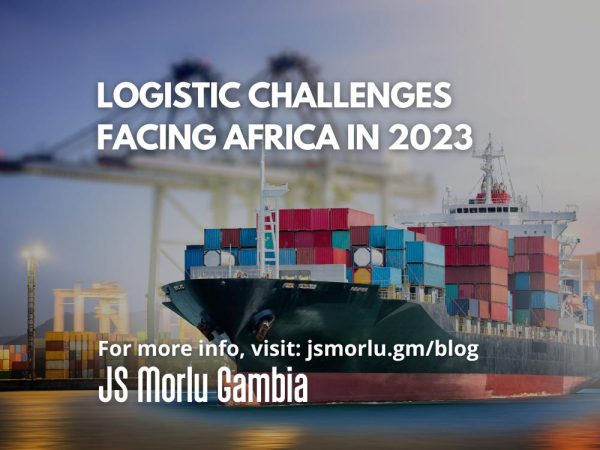Africa is a continent of immense diversity, with a rich heritage and culture that spans thousands of years. From the vibrant Bantu culture that has spread across the continent, to its vast natural resources, Africa is a unique and fascinating place. Despite facing many challenges, such as poverty and political instability, Africa continues to inspire with its resilience and determination. With its diverse landscapes, unique wildlife, and vast mineral resources, Africa has the potential to be a major player in the global economy. The continent’s rich heritage and culture provide a deep well of inspiration and creativity, while its natural resources offer endless opportunities for growth and development. Indeed, there is much to celebrate about Africa, and its potential for greatness is truly boundless.
However, in all her glory, she does face some major logistics challenges that need to be addressed to stop the haemorrhaging of economic growth and social welfare.
1. Poor Infrastructure
Africa’s logistics sector suffers from inadequate infrastructure such as roads, railways, and ports, which limits the movement of goods within and outside the continent. One solution is to invest in improving these inadequate infrastructures. For example, governments could partner with private companies to build new roads and highways, expand ports, and upgrade railway systems. This would help to reduce transportation costs and improve logistics efficiency.
2. Limited Access to Finance
Many African logistics firms struggle to access finance to invest in new technologies, infrastructure, and equipment. This makes it difficult for them to improve their services and compete effectively. Governments and development organizations could create financial programs specifically targeted at logistics firms. For example, they could offer low-interest loans, grants, and subsidies to help logistics companies invest in new technologies and equipment. Additionally, the establishment of logistics-specific financial institutions could improve access to finance for the sector.
3. Political Instability
Some parts of Africa experience political instability, which affects the logistics sector. Instability can lead to disruptions in supply chains, making it difficult to transport goods across borders. Encouraging political stability is critical for improving logistics in Africa. Governments can support this by creating an enabling environment for businesses, addressing corruption, and ensuring fair trade policies. Additionally, regional and international organizations can play a role in conflict resolution and peacekeeping efforts.
4. Fragmentation of Markets
The African market is highly fragmented, with multiple languages, cultures, and regulatory frameworks. This makes it difficult for logistics companies to operate across different regions. However, encouraging political stability is critical for improving logistics in Africa. Governments can support this by creating an enabling environment for businesses, addressing corruption, and ensuring fair trade policies. Additionally, regional and international organizations can play a role in conflict resolution and peacekeeping efforts.
5. Lack of Skilled Workforce
The logistics sector in Africa is hampered by a lack of skilled workers. This is due to inadequate training and education programs and a brain drain of skilled workers to other countries. Governments and private companies could invest in education and training programs for logistics workers. For example, vocational schools and apprenticeship programs could be established to provide specialized training for logistics jobs. Additionally, companies could offer on-the-job training and provide incentives for employee development to improve retention rates.
Implementing these solutions and strategies would require significant investment and collaboration between governments, private companies, and development organizations. However, they have the potential to significantly improve the logistics sector in Africa and drive economic growth. We can take practical examples from DHL and
- DHL Africa: DHL Africa is a logistics company that operates in several African countries, offering services such as freight forwarding, warehousing, and transportation. The company has invested heavily in infrastructure, including building new warehouses and improving transportation networks, to address the infrastructure challenges facing Africa. The company has also implemented several initiatives to address the lack of access to finance in Africa, including partnering with financial institutions to offer to finance to small and medium-sized enterprises (SMEs).
- Africa Logistics Properties: Africa Logistics Properties is a real estate company that builds and manages modern warehouses and logistics parks in several African countries. The company’s warehouses are designed to international standards and are equipped with modern technologies to address the infrastructure challenges facing African logistics.
- Bollore Transport and Logistics: Bollore Transport and Logistics is a logistics company that operates in several African countries, offering services such as freight forwarding, warehousing, and transportation. The company has implemented several initiatives to address the infrastructure challenges facing the logistics sector in Africa, including investing in the construction of new logistics hubs and improving transportation networks.
- Tanzania Topmax Limited: TopMax Tanzania Limited is a young dynamic logistics company established in the year 2016 and in that time has achieved notable success in recent years. The company was founded with the aim of providing reliable and efficient logistics services to clients in Tanzania and the wider East African region. Today, the company has grown to become one of the leading logistics providers in Tanzania, with a reputation for excellence in service delivery and customer satisfaction.
In conclusion, there are several companies in Africa that are implementing solutions or strategies to address the major challenges facing the continent. These challenges include infrastructure deficiencies, lack of access to finance, and a shortage of skilled labour, among others. Companies such as DHL Africa, Tanzania Topmax Limited, Africa Logistics Properties, Agility Logistics, and Bollore Transport and Logistics are among the organizations that are driving economic growth and development in Africa through logistics. These companies are helping to address some of the key challenges facing the logistics sector in Africa, which in turn is contributing to the growth and development of the continent as a whole. With continued investment and innovation, there is no doubt that these companies will continue to play an important role in shaping the future of logistics in Africa, and driving economic growth and development across the continent.
Original Source: LinkedIn
